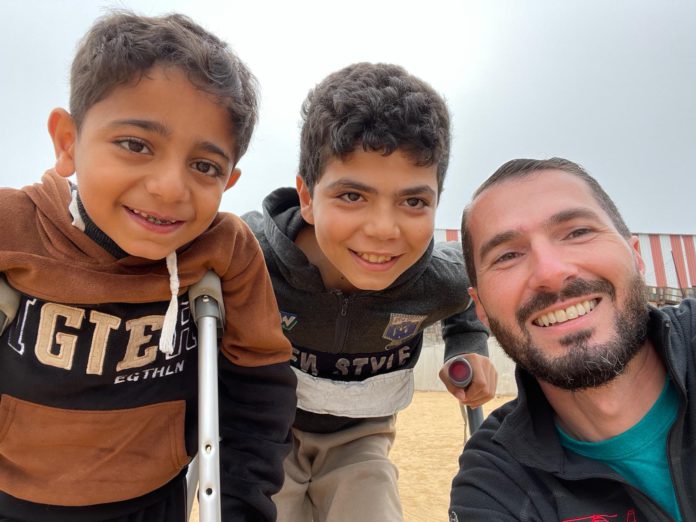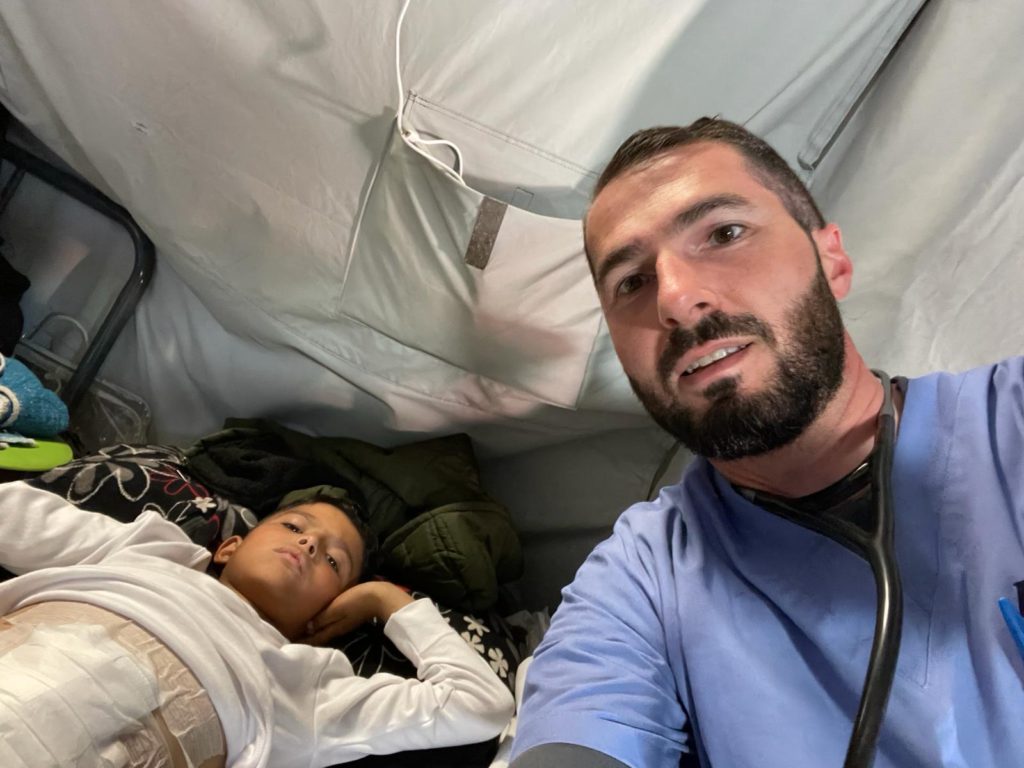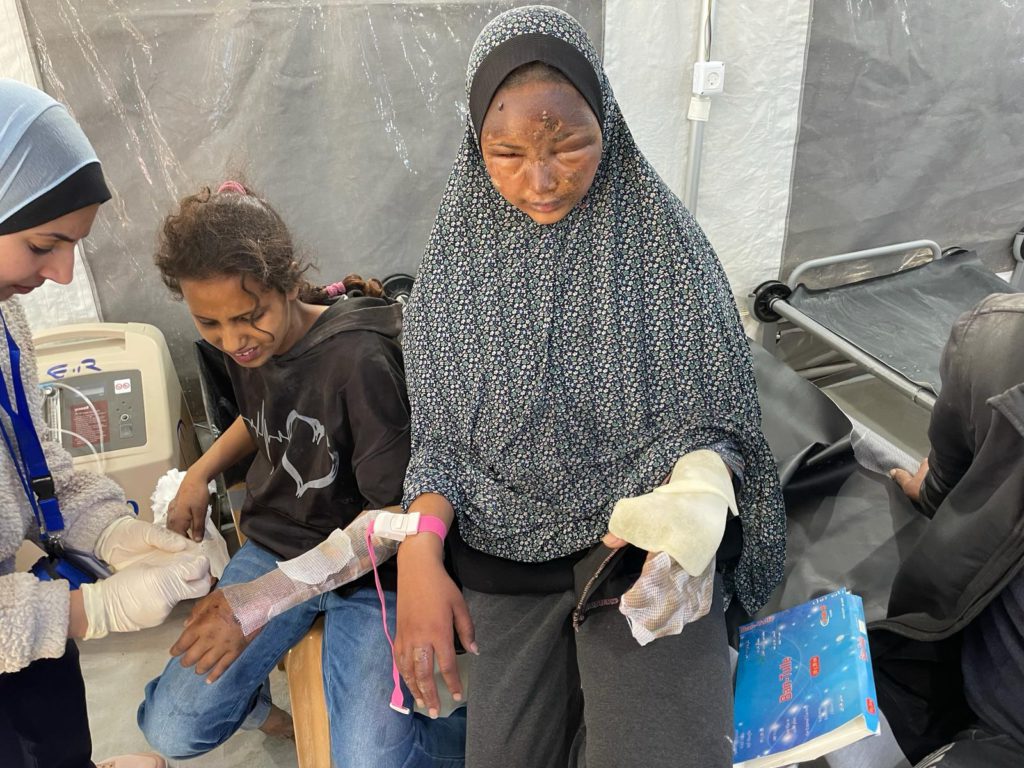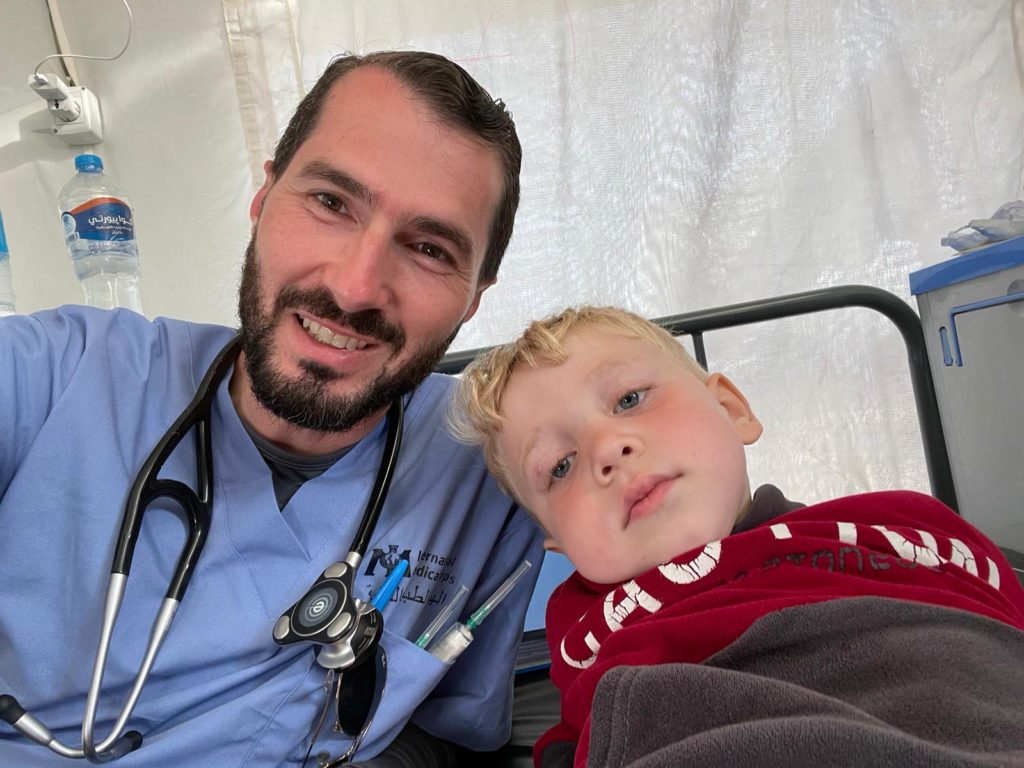
Children consoling one another amidst loss. A ragged man offering cookies outside a field hospital. Words of comfort from a colleague, as he shed a tear for a mother’s grief.
These memories are etched into the mind of Dr. Mohammad Subeh from his recent trip to Rafah, Gaza. It’s a city that experiences airstrikes as the United Nations calls for a ceasefire. Subeh recently returned after serving as a volunteer emergency room physician.
“It’s very difficult to see your loved ones—especially your children—being killed in front of your eyes,” he said to 150-200 people at the Los Gatos Islamic Center on Friday night. “I met many children who were orphans. Over the past several months, I grew very deep bonds with them.”
Subeh, a WVMA board member, shared his impressions at the West Valley Muslim Association facility on Farley Road, following Ramadan prayers known as Taraweeh:
The sounds of injured civilian screams; the cries of a mother mourning a dead child; the missile blast vibrations reverberating; the buzz of “drones that would be above your head, like annoying hornets.”
Attendees remained mostly silent as the El Camino Health doctor and Silicon Valley entrepreneur spoke, the clean lines of the room providing an orderly contrast to the chaos of his words.
The moans of pain he heard as he first entered a medical tent seemed a world away in this sanctuary. Yet their echoes lingered in the hushed reverence of the audience.

Only a few coughs and random cries from children punctuated Subeh’s speech.
Subeh, 39, spent five weeks overseas with the International Medical Corps in Rafah, which lies near Gaza’s southern border. The 25-miles long, six-miles wide strip, home to more than two million Palestinians, lies surrounded by Egypt, Israel and the Mediterranean Sea.
“We were trying to re-humanize Palestinians,” said Naiema Din, Subeh’s wife, 36, mother to Ahmad, 13 and Majed, 7. “It always hurts to say that because it’s like, why would anyone need to be ‘re-humanized?’ They’re just as deserving of freedom and peace and justice as anyone else.”
Subeh went to fix broken bodies, fractured lives and shattered spirits. From his address, it seemed that, sometimes, the healing was mutual. Subeh sounded amused, for example, as he talked about playful off-duty interactions with some of his young patients.
And now, Subeh is attempting to build support for a cease-fire. The Palestinian-American immigrant, who moved to Silicon Valley from Los Angeles, has appeared on national TV programs, in front of the WMVA, and is currently reaching out to members of Congress.
As of Monday, Gaza’s Ministry of Health reported more than 32,000 Palestinians had been killed and almost 75,000 injured, since Oct. 7, after Israel responded to a deadly cross-border attack by Hamas militants that continue to hold Israeli hostages in Gaza.

“It’s imperative for all of us to be speaking out right now,” Subeh’s wife Din told the Los Gatan in a telephone interview after the talk. “Stop the bombing. Stop the killing.”
The United States abstained from a United Nations resolution Monday calling for an immediate ceasefire in Gaza. In response, Israel’s Prime Minister Benjamin Netanyahu grounded two advisors who were scheduled to travel to America. US officials cited the resolution’s failure to condemn Hamas, Gaza’s governing entity, for the abstention.
Israel declared war after Hamas killed at least 1,200 Israelis and wounded more than 3,300 on October 7, 2023. The Israeli government says Hamas and Palestinian Islamic Jihad still holds more than 129 foreigners and Israelis hostage, some of whom are believed to be dead.
“With all of these stories, we’re trying to show these people aren’t just numbers,” Din said. “These are people. When Mohammad shares their stories, he’s reminding us that these are real children who had hopes and dreams who like to play and fly kites, and, many of whom they can’t anymore.”
About 40 percent of Palestinians in Gaza are under the age of 15, according to the Palestinian Central Bureau of Statistics.

Subeh is known for starting a business in Los Gatos called Kenz Coffee Roasters. Since he took off to Gaza, Din’s been responsible for roasting duties.
On the other side of the world, Subeh engaged in a series of daily rituals with the children he was treating. Each afternoon, he’d fly a kite with a 7-year-old boy named Anas, whose entire family had been killed. Anas himself lost his shin and needed a prosthetic. Yet, Subeh noted, the children rushed to comfort another boy Subeh was counseling one day. The boy, Maher, had lost his cousin to a bombing.
Before he could ward them off to give Fou’ad privacy, Anas and his friends Yousef and Sammy all went to comfort their peer once they saw that he was crying. They reminded Fou’ad that “We belong to Allah and we will return to Allah,” Subeh said. “That is the one thing that stopped his crying.”
“They saw their parents killed in front of their eyes,” Subeh said. “How many of us would be able to cope with that injustice? And yet they were able to help this young boy who just found out his best friend was killed and help him feel tranquility. I’ll never forget that.”

Subeh urged his community to amplify the war-time experiences of Gaza’s civilians.
“One of the greatest bounties (Allah) has given us is our ability to speak up,” he said. “Our ability to knock on doors, to be loud, to really make sure our voices are heard and not be afraid, because when we mobilize together, we’re much more powerful than any one of us individually.”
Many in the Palestinian-American community, including Subeh himself, still have family ties in Gaza: Subeh’s aunt, cousins, niece and nephews were rendered homeless by bombs two weeks after the war started. Since then, they’ve been on the move—fleeing the military operations and staying in bombed-out buildings and aid organization shelters. Subeh and his family of four in Saratoga are part of an estimated 26,000 Palestinians living in California, according to Census data.
The team Subeh was part of in Gaza treated approximately 700-800 patients a day (including about 40 surgeries and delivering about 10-20 babies). Back at work in El Camino Hospital in Mountain View, his routine averaged around 170 patients on a normal day. Subeh said that part of his job in Rafah was also to recruit and train local doctors.
Subeh and his wife’s strong faith is the primary motivating force behind their actions.
“This life, and how we make use of what Allah has given us, really determines our eternity.”
“The community is processing the pain,” Din said. “Every single day, the situation gets worse.”
*Two names have been updated to reflect more accurate information










